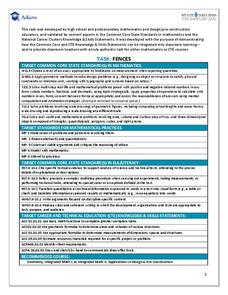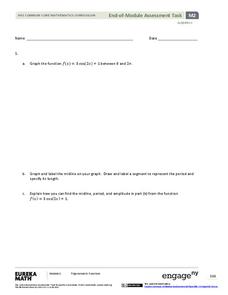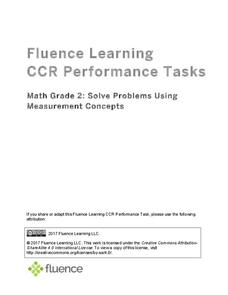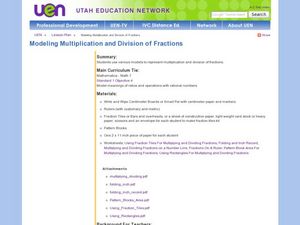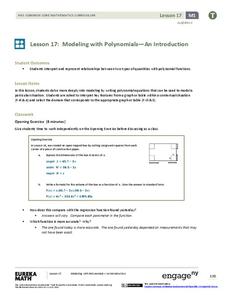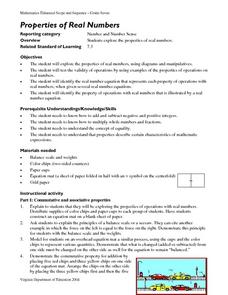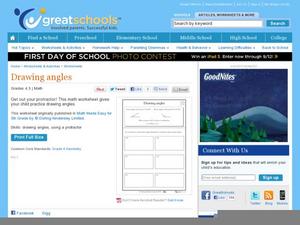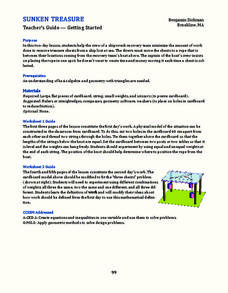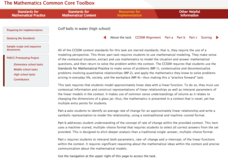American Statistical Association
Armspans
Young mathematicians collect data on the arm spans of classmates. Then they sort the data by measures of center, spread, and standard deviation. Finally, they compare groups, such as boys and girls, to interpret any differences.
Mathematics Assessment Project
Representing Functions of Everyday Situations
Functions help make the world make more sense. Individuals model real-world situations with functions. They match a variety of contexts to different function types to finish a helpful resource.
Perkins School for the Blind
Baseball
Baseball is an American pastime, super fun to play, and can be made accessible to learners with visual impairments. Instead of taking to the ball field, your class can learn the rules of the game by playing a small three-dimensional...
Achieve
Fences
Pupils design a fence for a backyard pool. Scholars develop a fence design based on given constraints, determine the amount of material they need, and calculate the cost of the project.
EngageNY
Algebra II Module 2: End-of-Module Assessment
Will this be on the test? Learners demonstrate their understanding of trigonometric functions with an end-of-module assessment. They investigate two different real-world situations, one function in pure mathematics, and one potential...
Fluence Learning
Solve Problems Using Measurement Concepts
Young mathematicians demonstrate what they know about measurement with a four-task assessment that focuses on estimation, length, and inches.
Curated OER
Modeling Multiplication and Division of Fractions
Create models to demonstrate multiplication and division of fractions. Using fraction tiles to model fractions, pupils explore fractions on a ruler and use pattern blocks to multiply and divide. They also create number lines with fractions.
Curated OER
House and Holmes: A Guide to Deductive and Inductive Reasoning
Test your pupils' reasoning skills with several activities and a quick mystery to solve. Learners watch and analyze a few video clips that demonstrate reasoning in action, practice deduction with an interactive and collaborative...
EngageNY
Modeling with Polynomials—An Introduction (part 2)
Linear, quadratic, and now cubic functions can model real-life patterns. High schoolers create cubic regression equations to model different scenarios. They then use the regression equations to make predictions.
Virginia Department of Education
Properties of Real Numbers
Students use paper cups and colored chips to observe properties of operations with real numbers. As a class, students brainstorm and use manipulatives to demonstrate associative, commutative, distributive identity and inverse properties....
PBS
Arguing over Area
With the help of the Area Officers and Perimeter Patrol, you learners will develop a better understanding of area and its relationship to perimeter. First, they view a video clip from Cyberchase, and then they visit a website to test...
Curated OER
Drawing Angles
Get out those protractors! Once geometers can identify obtuse, acute, right, and straight angles, get them to measure and draw their own. There are six boxes here, each with an angle measurement. Learners use a protractor to draw the...
DK Publishing
Using a Protractor
Learn how to measure acute, right, and obtuse angles with a protractor. After reviewing the way the protractor works, fourth graders measure nine angles on their own. For extra practice, have them measure different angles in their...
Baylor College
Breathing Machine
Take a deep breath and have your class construct working models of a lung! Using 500ml plastic bottles as the chest cavity, and balloons for the lung and the diaphragm, learners work in groups to make a model. The models help them to...
Charleston School District
Review Unit 2: Congruence and Similarity
Review for the test with a comprehensive list of terms and concepts for the unit on congruence and similarity. It divides divides the sections in the order of the lessons presented during the unit.
Mathematics Assessment Project
Estimating Volume: The Money Munchers
Don't stuff money under your mattress. To find out why learners first complete a task determining how $24,000 in cash would affect the height of a mattress and whether this same amount would fit into a suitcase of given dimensions. They...
Mathematics Assessment Project
Solving Linear Equations
Linear equations are the focus of activities that ask learners to first complete a task that involves interpreting algebraic expressions and solving linear equations. They then take part in a card activity matching equations, situations,...
Mathematics Assessment Project
Matching Situations, Graphs and Linear Equations
What do guitars, candles, and helicopters have in common? They're all in this resource. Learners complete an assessment task to determine the amount of profit made in a guitar class based on given information regarding variable...
Mathematics Assessment Project
Generalizing Patterns: Table Tiles
As part of a study of geometric patterns, scholars complete an assessment task determining the number of tiles needed to cover a tabletop. They then evaluate provided sample responses to see different ways to solve the same problems.
Curated OER
Sunken Treasure
You've located buried treasure, now what? Explore how to use algebraic and geometric methods to determine where to place a recovery ship based on the location of the treasure.
Mathematics Assessment Project
Modeling Motion: Rolling Cups
Connect the size of a rolling cup to the size of circle it makes. Pupils view videos of cups of different sizes rolling in a circle. Using the videos and additional data, they attempt to determine a relationship between cup measurements...
Mathematics Common Core Toolbox
Golf Balls in Water
Here's a resource that models rising water levels with a linear function. The task contains three parts about the level of water in a cylinder in relationship to the number of golf balls placed in it. Class members analyze the data and...
Virginia Department of Education
Angles in Polygons
Polygons — it's all about the angles. Groups work with dynamic geometry software to find the sum of the measures of the angles of various polygons. After finding the information for several polygons, the groups generate a formula that...
Teach Engineering
Catching the Perfect SAR Waves!
Zero in on an interesting resource involving radar technology. Groups construct a radar sensing unit and learn to calibrate the system. Using the radar system and the Pythagorean Theorem, they calculate distances between objects.
Other popular searches
- Building Construction Math
- Construction Math Triangle
- Math on Construction Workers
- Mathematics in Construction
- Stadia Construction Math
- Staid Construction Math





